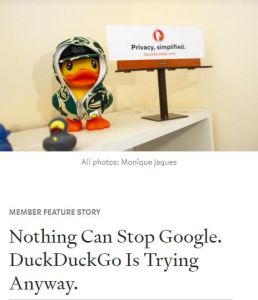
Drew Millard
Nothing Can Stop Google. DuckDuckGo Is Trying Anyway.
Medium, 2019
What's inside?
Does privacy matter anymore? The search engine DuckDuckGo thinks so.
Recommendation
In today’s world, is privacy passé? Car insurance companies offer lower rates to customers who install devices that monitor their driving habits. Online and offline activities are constantly recorded and logged for the sake of advertisers, government officials, and other entities. In this climate, the search engine DuckDuckGo aims to help people regain some anonymity. Freelance writer Drew Millard explores how the company hopes to gain prominence. Amid growing data breaches and privacy violations, this compelling article is a must-read for anyone seeking a break from digital surveillance.
Take-Aways
- Amid increasing mistrust of tech, the search engine DuckDuckGo is making a name for itself as a champion of privacy.
- Whether it will be a successful alternative to Google or “a last dying gasp before surveillance capitalism finally takes over the world,” time will tell.
- According to DuckDuckGo CEO Gabriel Weinberg, “You can run a profitable company – which we are – without [using] a surveillance business model.”
- With more than $25 million in annual revenue and 55 employees, DuckDuckGo now aims to improve its brand recognition.
- Google users sacrifice privacy for convenience, and the tech giant won’t cede its dominance easily.
Summary
Customers’ personal data have been compromised by countless companies including Marriott Hotels, Adidas, Dunkin’, Sears and Best Buy. Facebook has been under fire for allegedly offering users’ private messages to third parties, and propagating fake news. Amid increasing mistrust of tech, the search engine DuckDuckGo is making a name for itself as a champion of privacy.
“You can run a profitable company — which we are — without [using] a surveillance business model.” (DuckDuckGo CEO Gabriel Weinberg)
The Pennsylvania-based company’s tools are more accessible to laypeople than specialized services like Tor and SecureDrop. DuckDuckGo founder Gabriel Weinberg reckons traffic for the site has increased an average of 50% per year, answering a record 33,626,258 search queries in one day. Whether it will be a successful alternative to Google or “a last dying gasp before surveillance capitalism finally takes over the world,” time will tell.
“To succeed, these companies will have to make privacy as accessible and simple as possible.”
According to Weinberg, a surveillance-based business model is unnecessary. DuckDuckGo grew out of his lifelong passion for a free flow of information. Weinberg founded DuckDuckGo in 2008, and it began selling ads off search keywords instead of logging people’s online activities. Its popularity grew in 2011 after posting a bulletin board in the Bay Area saying, “Google tracks you. We don’t.” The site first profited in 2013 after Edward Snowden blew the whistle on NSA surveillance that used Facebook, Yahoo, Apple, and other big companies’ servers. With more than $25 million in annual revenue and 55 employees, DuckDuckGo now aims to increase its brand recognition.
“Even though DuckDuckGo may serve a different market and never even challenge Google head-on, the search giant remains its largest hurdle in the long term.”
Google users sacrifice privacy for convenience. While users have their every move tracked and echoed in ads, they also have access to no-cost email and customized web searches. Weinberg wants DuckDuckGo to become a “second option.” Google won’t give up its dominance easily. The tech giant took almost a decade to release the domain Duck.com to DuckDuckGo and could easily develop its own anonymous search engine. However, people looking for a company they can trust may turn instead to DuckDuckGo.
About the Author
Drew Millard is a freelance writer based in North Carolina. He’s worked as an editor for The Outline, VICE and Kill Screen LLC.
This document is restricted to personal use only.
My Highlights
Did you like this summary?
Read the articleThis summary has been shared with you by getAbstract.
We find, rate and summarize relevant knowledge to help people make better decisions in business and in their private lives.
Already a customer? Log in here.
















Comment on this summary